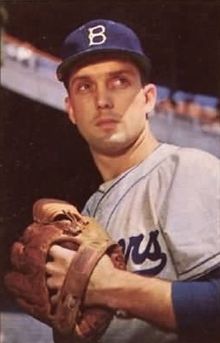He was known as "Oisk" to Brooklyn Dodgers fans. Today is Carl Erskine's 94th birthday. The last of the Boys of Summer still with us. Happy birthday Mr Erskine!

An Indiana boy, Carl joined the Dodgers in 1948 and remained with the team until his retirement in 1959. A perpetually sore-armed hurler, Oisk got by on guile and "stuff". He had a decent career, winning 122 games, peaking between 1951 and 1954, with 1953 his best season, winning 20 and striking out a then-record 14 Yankees in the third game of the World Series. Along the way he also threw two no-hitters. During his first 7 seasons, the Dodgers won the National League pennant five times and twice lost on the last day of the season; in 1950 to the Phillies and in 1951 when Bobby Thomson of the Giants hit the shot heard round the world. Carl had been warming up in the bullpen along with Ralph Branca, when manager Charlie Dressen decided to bring Branca in to face Thomson.
But that's not why I'm writing about Carl Erskine.
I only became aware that Oisk was still around by reading Vin Scully's tweet on November 20, retelling a story about Carl. And, yes, this fall, Vin Scully went on social media, Twitter and Facebook. It's a joy to read and listen to him again.
Intrigued by Vin's story, I took a look at Carl's life and it is the story of a good man.
Erskine joined the Dodgers the year after Jackie Robinson broke the color barrier.
Indiana, where Carl was born in 1926, was a hotbed of KKK activity and racial prejudice at the time. His father was opposed to what was going on and did not want his sons growing up with hatred. In The Boys of Summer, Carl tells this story:
“around 1930 there was a lynching 30 miles north of Anderson in a town called Marion. The day after it happened, Dad drove me up and showed me where it was. Two Negroes had been taken out of the jail and hung in the jail yard. I can still see that naked branch. There had been a scramble. People had made off with things as souvenirs. But there was a piece of rope. I saw a lynching rope before I was 10.”
He then went on to explain:
“One Negro boy grew up in my neighborhood, Johnny Wilson. We played grade school basketball together; he made All-State in high school and went onto the Harlem Globetrotters. He’s a high school coach today. Jumpin’ Johnny Wilson ate maybe as many meals at my home as he did at his own. With a background like that, the Robinson experience simply was no problem. It was really beautiful in a way.”
In 1946 Carl pitched on a Cuban League team managed by Negro League legend Martin Dhigo. And after joining the Dodgers, he became one of the first major league players to have a black roommate on road trips (back in those days, players shared rooms while on the road).
From all accounts, Carl was a great teammate and a fan favorite because of his approachability, a characteristic he's retained to this day.
After the end of his baseball career, Carl returned to Indiana and became an insurance agent and eventually a bank president (he was also President of the Indiana Bankers Association in the early 90s). He also coached baseball at a local college, winning four conference championships, and beloved by his players.
Carl's fourth child, Jimmy, was born with Downs Syndrome, leading to Erskine's long involvement with the Special Olympics. Interviewed by Roger Kahn for The Boys of Summer , the author asked, “What do you think, your life would have been if you hadn’t been a pitcher?” Carl replied, “I don’t know. It’s like asking what my life would be without Jimmy. Poorer. Different. Who knows?”
Carl & Jimmy

According to Wikipedia,
Erskine also donated part of his land to the Anderson Community School System to build a new school, which was named Erskine Elementary. Erskine serves as a member of the advisory board of the Baseball Assistance Team, a 501(c)(3) non-profit organization dedicated to helping former Major League, Minor League, and Negro League players through financial and medical difficulties.
Carl has also written several books, including What I Learned From Jackie Robinson (2005).
Oisk and his wife, Betty, have been married for more than 70 years.
A life well-lived.
No comments:
Post a Comment